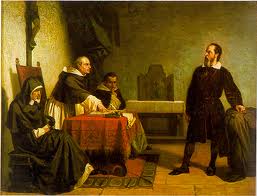
Since the 15th century Renaissance, the Catholic Church vigorously endorsed the arts and the sciences, and by the 17th century, it was extremely interested in astronomy; so much so that the Catholic Church was the largest benefactor during that period. In fact, Copernicus published his theories and dedicated the book to Pope Paul III, who was extremely impressed. Even Galileo's friend Clavius was responsible for developing the Gregorian calendar; he was completely supported by the Catholic Church.
Galileo's popularity and his success with "Starry Messenger" had boosted his ego so much that he became almost pompous. Some wonder whether his problems arose because of his rudeness to the Church or his fellow scientists, several of whom had liaisons with the Church. A new pope came in and took over the Vatican. Pope Urban admired Galileo and even supported Galileo's son with a pension. Then, in 1632, Pope Urban asked Galileo if he would like to write about the comparisons between Copernicus' and Ptomely's theories but he wanted Copernicus' theories presented "as a hypothesis, not as an established fact" (Little 32). What ensued was a battle of egos; Galileo "managed to alienate almost everybody with his caustic manner and aggressive tactics. His position gave the Church authorities no no room to maneuver: they either had to accept Copernicanism as a fact (even though it had not been proved and interpret the Scripture accordingly; or they had to condemn it" (Johnston "The Galileo Affair"). Of course, the Church gave Galileo a third option, which he refused to acknowledge: that Copernicanism is only a hypothesis, even though it was more remarkable that Ptomely's system (Johnston "The Galileo Affair").
Was Galileo really a heretic? Some scholars feel that Galileo was really being punished for not listening. He had agreed that he would not publicly acknowledge his belief in Copernicanism and that he would not defend Copernicanism. He broke his promise when he published "Dialogue on the Two Chief World Systems." Nevertheless, Galileo was called to the inquisition at the Vatican in 1633 and found guilty of heresy, though it was a lesser form of heresy, called "vehement suspicion of heresy," and not the most serious form (Finocchiaro 126).
Cardinal Barberini, who advocated leniency and questioned the decision to bring Galileo to court, did not sign the decree. Galileo asked that two charges be deleted from the sentence, the first being that he was a bad Catholic and the other being that he obtained permission to publish under false pretenses, and Galileo's request was granted. He had tried to change the world's view of the universe and “the traditional exegesis of Scripture by beating his head against a wall of conservatism and mocking those who felt that it should not be torn down" (Langford 154-5).
